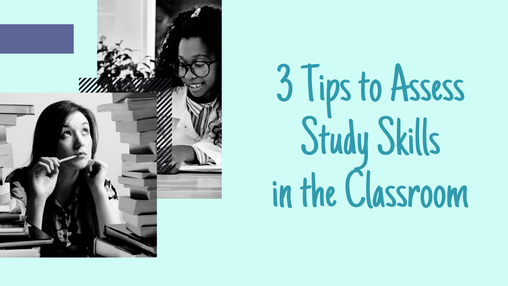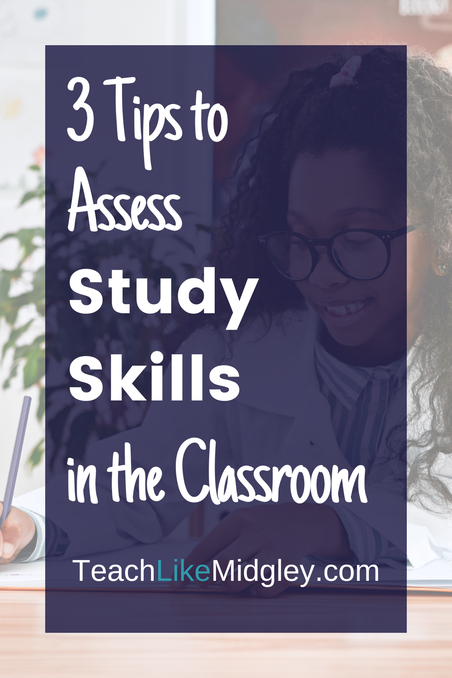3 Easy Tips to Assess Study Skills in the Classroom
Study skills are essential to learning. But when is the best time to teach these skills? And how can you know what skills need to be taught?
Developmentally, the middle school student is at the ideal age for learning study skills. At this stage, students are developing habits that will “stick” and follow them through high school and college.
Developmentally, the middle school student is at the ideal age for learning study skills. At this stage, students are developing habits that will “stick” and follow them through high school and college.
But where to begin?
Usually the best place to begin is with assessing your students.
Where are they thriving? And what do they need help with?
On top of all the other curriculum we must get through, is it worth taking the time to assess and teach study skills?
Keep reading for 3 tips on assessing study skills in your classroom.
Give a Survey
Assess study skills quickly and effectively with this strategy. A simple survey can be very enlightening.
Just knowing when and where students complete their homework can tell you a lot about their approach to school.
This approach definitely has its advantages. For one, it’s quick. And surely you can spare 10 minutes for students to take a survey. In fact, it can even be a quick bell ringer or warm-up activity one day.
Using a survey is also low-key and non-threatening. Nobody is being put “on the spot” and the answers are private. It’s also a helpful tool when conferencing with parents. Any time you can have information like this written by the actual student, the information carries more weight.
On the other hand, you do have to take the time to read through the responses. And mentally track who is saying what.
Just knowing when and where students complete their homework can tell you a lot about their approach to school.
This approach definitely has its advantages. For one, it’s quick. And surely you can spare 10 minutes for students to take a survey. In fact, it can even be a quick bell ringer or warm-up activity one day.
Using a survey is also low-key and non-threatening. Nobody is being put “on the spot” and the answers are private. It’s also a helpful tool when conferencing with parents. Any time you can have information like this written by the actual student, the information carries more weight.
On the other hand, you do have to take the time to read through the responses. And mentally track who is saying what.
Watch for Specific Skills
Assess study skills on a daily basis. It’s not hard to look around the classroom and see who is using their time wisely and who isn’t.
If the majority of students are not completing the assigned tasks during work time - you should first analyze the tasks you’ve given, to make sure they are appropriate - and then probably teach some time management skills.
If students are forgetting their homework or can’t find their class materials, then you may need to teach some organization skills.
Are your students struggling to prepare for tests? Most likely they aren’t studying because… they don’t know how to study!
One of the biggest mistakes middle school teachers make, is expecting students to study for their tests. Don’t get me wrong - this is a legit expectation. But you must actually teach your students how to study, before expecting them to do it themselves.
These are just a few examples of assessing study skills on a daily basis. Most likely though, if you are reading this post, then your students already need help with their study skills!
If the majority of students are not completing the assigned tasks during work time - you should first analyze the tasks you’ve given, to make sure they are appropriate - and then probably teach some time management skills.
If students are forgetting their homework or can’t find their class materials, then you may need to teach some organization skills.
Are your students struggling to prepare for tests? Most likely they aren’t studying because… they don’t know how to study!
One of the biggest mistakes middle school teachers make, is expecting students to study for their tests. Don’t get me wrong - this is a legit expectation. But you must actually teach your students how to study, before expecting them to do it themselves.
These are just a few examples of assessing study skills on a daily basis. Most likely though, if you are reading this post, then your students already need help with their study skills!
Incorporate Study Skill Lessons
Once you assess study skills, you need a plan to help your students develop these essential skills.
Not sure what study skills to assess for? Check out this blog post: 6 Basic Study Skills you should be Teaching your Students.
The good news is that incorporating study skills isn’t hard.
There are strategies you can use to include some study skill lessons within the content you're already teaching.
You can easily slip questions about study skills into your bell-ringer or morning warm-up.
Set up expectations for organization with your class materials, and provide support to help make sure your students are actually using the system.
Provide some structure to your work time in the classroom.
These are just a few examples of how you can integrate study skills into your daily lessons.
Not sure what study skills to assess for? Check out this blog post: 6 Basic Study Skills you should be Teaching your Students.
The good news is that incorporating study skills isn’t hard.
There are strategies you can use to include some study skill lessons within the content you're already teaching.
You can easily slip questions about study skills into your bell-ringer or morning warm-up.
Set up expectations for organization with your class materials, and provide support to help make sure your students are actually using the system.
Provide some structure to your work time in the classroom.
These are just a few examples of how you can integrate study skills into your daily lessons.
Final Thoughts...
The truth is, there are two approaches you can take to teaching your students study skills.
The good news? I have materials to help you with both strategies.
Strategy #1 - Stand-Alone Study Skills Lessons
These types of lessons work well for these situations:
Strategy #2 - Integrate Study Skills into your Curriculum
This is actually the best approach to teaching study skills. Instead of teaching these skills in isolation, you are actually helping students apply the skills, which has way more benefit to the students.
The good news? I have materials to help you with both strategies.
Strategy #1 - Stand-Alone Study Skills Lessons
These types of lessons work well for these situations:
- There are just a few skills that need to be taught
- You have some time that needs to be filled
- You have an advisory or homeroom that needs some structure
Strategy #2 - Integrate Study Skills into your Curriculum
This is actually the best approach to teaching study skills. Instead of teaching these skills in isolation, you are actually helping students apply the skills, which has way more benefit to the students.
You May Also Like...
Let's Connect...

Welcome! I'm Hillary Midgley, a veteran 6th grade teacher.
I create educational materials and develop curriculum for other teachers. I specialize in teaching students how to learn through my Study Skills Curriculum. I have established fundamental classroom systems and structures for teachers to help them streamline their classroom. And my passion is teaching ancient history through engaging activities with foundations in academic skills. Here you will find resources on all of these topics and more. Learn more about me here.
|







